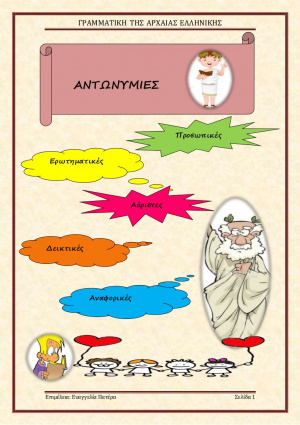Language/Ancient-greek-to-1453/Grammar/Ancient-Greek-Correlatives
|
Ελληνικά |
English |
Français |
|---|---|---|
| Συσχετικές αντωνυμίες | Correlative Pronouns | Pronoms Corrélatifs |
| Όταν κάνουμε μια ερώτηση,
χρησιμοποιούμε συγκεκριμένες ερωτηματικές αντωνυμίες και αντίστοιχα μπορούμε να δώσουμε απάντηση με συγκεκριμένες αόριστες, δεικτικές ή αναφορικές αντωνυμίες. Οι αντωνυμίες λοιπόν που χρησιμοποιούμε σε αυτές τις περιπτώσεις, επειδή έχουν αυτή τη στενή σχέση μεταξύ τους, ονομάζονται συσχετικές. |
Correlative is a word that is paired
with another word with which it functions to perform a single function but from which it is separated in the sentence When we ask a question, we use pronouns specific interrogatives and respectively we can give an answer with pronouns: indefinite, demonstrative or relative. So the pronouns we use in these cases, although they have this relation close with each other, are called correlatives. The table below shows of the most important of these correspondence concerning the correlative pronouns. |
Corrélatif est un mot apparié
avec un autre mot avec lequel il fonctions pour effectuer un seul fonction mais dont il est séparés dans la phrase. Lorsque nous posons une question, nous utilisons des pronoms interrogatifs spécifiques et respectivement, nous pouvons donner une réponse avec des pronoms : indéfinis, démonstratifs ou des relatifs. Ainsi, les pronoms que nous utilisons dans ces cas, bien qu'ils ont cette relation étroite les uns avec les autres, sont appelés corrélatifs. Le tableau ci-dessous rend compte des plus importantes de ces correspondances concernant les adjectifs et les pronoms. Le tableau ci-dessous rend compte des plus importantes de ces correspondances concernant les pronoms corrélatifs. |
| Ερωτηματικές
Interrogative |
Αόριστες
Indefinite |
Δεικτικές
Demonstrative |
Αναφορικές
Relative |
|---|---|---|---|
| τίς ;
En :who? Fr :qui ? (identité) |
τις
En : any one, some one, some thing Fr :quelqu’un, quelque οὐδείς En : nothing Fr: aucun-e, rien μηδείς En : not one, not even one, nobody Fr : aucun, nul, personne |
ὅδε
(celui-ci) οὗτος (celui-là) ἐκεῖνος (celui-là) |
ὅς
En : his, here Fr : celui-ci, celle-ci, ceci, ὅστις quiconque, (celui qui, n'importe qui) ὅσπερ (celui qui) |
| πότερος ;
En : one of two Fr :qui des deux ? one of two ποῖος ; En : of what character, of what kind, of what quality Fr: de quel caractère, de quel genre, de quelle qualité |
ποιός :
En :kind, or quality
πᾶς * En : every (one) – tout Fr: tout |
τοιόσδε
tel τοιοῦτος tel |
οἷος
En : of which sort, such Fr : de quel genre, tel que ὁπότερος En : whichever of the two, whichsoever Fr : quel que soit, lequel des deux |
| πόσος ;
En : how much? how many? Fr : combien? combien de? |
ποσός d'une
(certaine grandeur) ὁ δεῖνα ἄλλος (autre) ἀμφότεροι (ἄμφω) (tous les deux) |
τόσοσδε
(si grand) τοσοῦτος |
ὅσος
En : as much as, as many as Fr : autant que, aussi grand que ὁπόσος En : of whatever size, number Fr: de n'importe quelle taille, nombre |
| πόσοι ;
En : how many Fr : combien? (en nombre) |
ἔνιοι
Fr : quelques-uns ἔκαστος En : each Fr : chacun |
τοσοῦτοι
(si nombreux) |
ὅσοι que
(aussi nombreux que) |
| πηλίκος ;
En : how old? Fr : de quel âge ? ποδαπός En : from which country? Fr : de quel pays? |
πότερος
En : one of two Fr : un des deux πηλίκος En : of some age, size Fr : d'un certain âge |
ἕτερος
l'autre des deux τηλίκος (si âgé) τηλικόσδε En: of such an age Fr: d'un tel âge τηλικοῦτος |
ἡλίκος
(aussi âgé que) ὁπηλίκος (quelque âgé que) ὁποδαπός (de quel pays) |
| Πτώση - Case | Ενικός - Singuliere | Πληθυντικός / Pluriel | ||||
|---|---|---|---|---|---|---|
| Ον.: nom. | πᾶς*: every (one) - tout | πᾶσα : toute | πᾶν | πάντες**
all men - tous |
πᾶσαι:toutes | πάντα***
Fr :tout le possible En :all possible |
| Γεν.: gen. | παντός | πάσης | παντός | πάντων | πασῶν | πάντων |
| Δοτ.: dat. | παντί | πάσῃ | παντί | πᾶσι | πάσαις | πᾶσι(ν) |
| Αιτ.: acc. | πάντα | πᾶσαν | πᾶν | πάντας | πάσας | πάντα |
| Κλ.: voc. | πᾶς | πᾶσα | πᾶν | πάντες | πᾶσαι | πάντα |
Author[edit source]
- Ευγενική χορηγία που στοχεύει να βοηθήσει μαθητές ή μη, απανταχού της Γης, που επιδίδονται στην εκμάθηση της ελληνικής γλώσσας!
- Contribution bénévole visant à aider les personnes, partout dans le monde, qui sont engagées dans l'apprentissage de la langue grecque !
- Voluntary contribution aimed at helping people, all over the world, who are committed to learning the Greek language!
Photo : Pinterest[edit | edit source]
Other Lessons[edit | edit source]
- Adjectives : General observations
- Accents in Ancient Greek
- Ancient Greek Adverbs
- Verb λύω: active voice
- Indefinite Pronouns
- Demonstrative Pronouns
- Future Tense
- Article, verb or relative pronoun?
- Ancient Greek Particles

